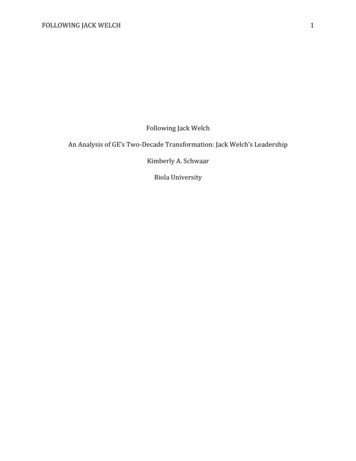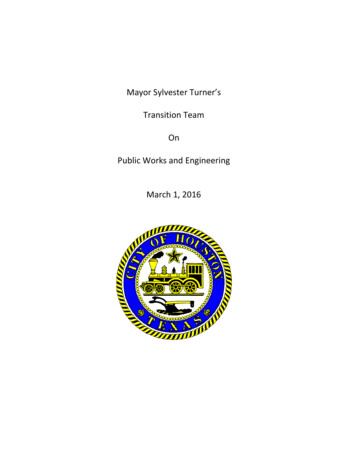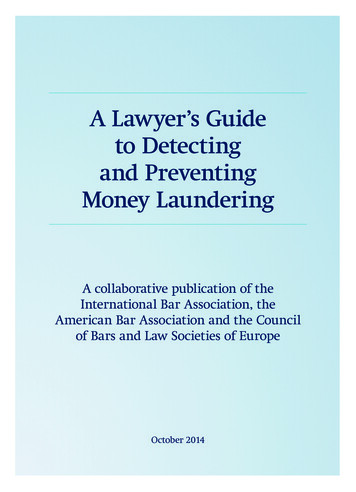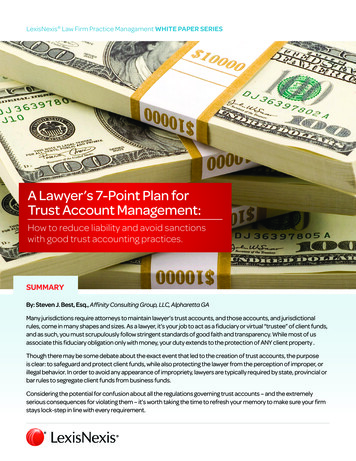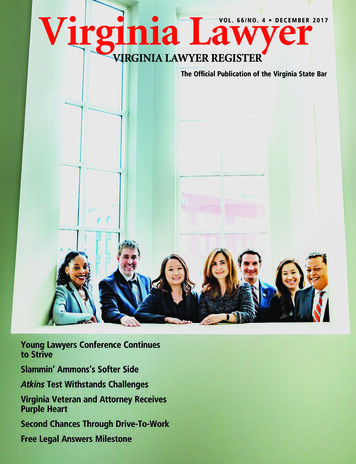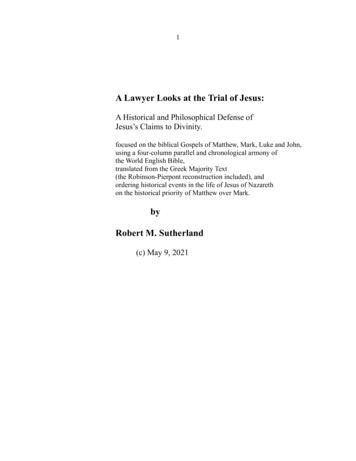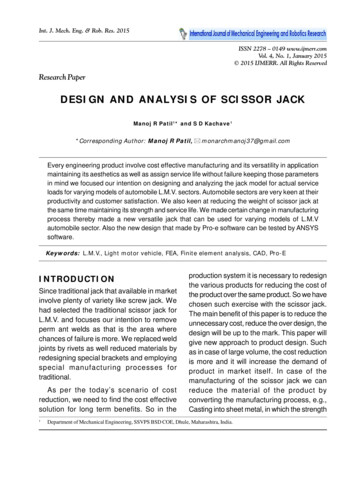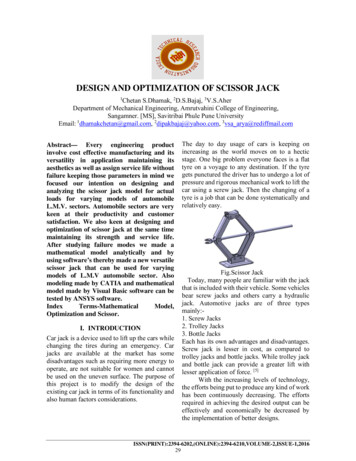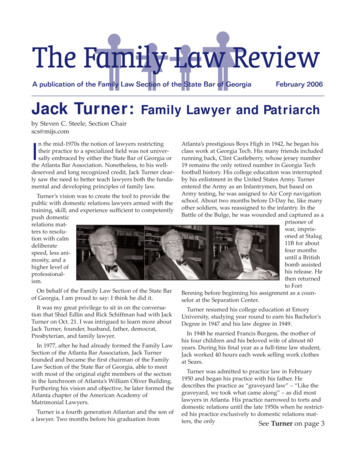
Transcription
Jack Turner:Family Lawyer and Patriarchby Steven C. Steele, Section Chairscs@mijs.comIn the mid-1970s the notion of lawyers restrictingtheir practice to a specialized field was not universally embraced by either the State Bar of Georgia orthe Atlanta Bar Association. Nonetheless, to his welldeserved and long recognized credit, Jack Turner clearly saw the need to better teach lawyers both the fundamental and developing principles of family law.Turner’s vision was to create the tool to provide thepublic with domestic relations lawyers armed with thetraining, skill, and experience sufficient to competentlypush domesticrelations matters to resolution with calmdeliberatespeed, less animosity, and ahigher level ofprofessionalism.On behalf of the Family Law Section of the State Barof Georgia, I am proud to say: I think he did it.It was my great privilege to sit in on the conversation that Shiel Edlin and Rick Schiffman had with JackTurner on Oct. 21. I was intrigued to learn more aboutJack Turner, founder, husband, father, democrat,Presbyterian, and family lawyer.In 1977, after he had already formed the Family LawSection of the Atlanta Bar Association, Jack Turnerfounded and became the first chairman of the FamilyLaw Section of the State Bar of Georgia, able to meetwith most of the original eight members of the sectionin the lunchroom of Atlanta’s William Oliver Building.Furthering his vision and objective, he later formed theAtlanta chapter of the American Academy ofMatrimonial Lawyers.Turner is a fourth generation Atlantan and the son ofa lawyer. Two months before his graduation fromAtlanta’s prestigious Boys High in 1942, he began hisclass work at Georgia Tech. His many friends includedrunning back, Clint Castleberry, whose jersey number19 remains the only retired number in Georgia Techfootball history. His college education was interruptedby his enlistment in the United States Army. Turnerentered the Army as an Infantrymen, but based onArmy testing, he was assigned to Air Corp navigationschool. About two months before D-Day he, like manyother soldiers, was reassigned to the infantry. In theBattle of the Bulge, he was wounded and captured as aprisoner ofwar, imprisoned at Stalug11B for aboutfour monthsuntil a Britishbomb assistedhis release. Hethen returnedto FortBenning before beginning his assignment as a counselor at the Separation Center.Turner resumed his college education at EmoryUniversity, studying year round to earn his Bachelor’sDegree in 1947 and his law degree in 1949.In 1948 he married Francis Burgess, the mother ofhis four children and his beloved wife of almost 60years. During his final year as a full-time law student,Jack worked 40 hours each week selling work clothesat Sears.Turner was admitted to practice law in February1950 and began his practice with his father. Hedescribes the practice as “graveyard law” – “Like thegraveyard, we took what came along” – as did mostlawyers in Atlanta. His practice narrowed to torts anddomestic relations until the late 1950s when he restricted his practice exclusively to domestic relations matters, the onlySee Turner on page 3
Editor’s CornerBy Randall M. rz.comHappy New Year! I hope that you enjoy this first issue of The Family Law Review for2006. As you can see, we are adding new concepts and expanding the scope of theFLR. One new feature will be short exposés on Superior Court Judges from aroundthe state - John Lyndon did a great job with the first one. We also are continuing toreceive articles on relevant family law topics from experts both within the State ofGeorgia and from other areas. Thank you to Mary Donne Peters for her excellent contribution on Daubert. Thanks also to the guru of military family law, Mark Sullivan, for hisarticle. We also appreciate the contributions by Mary Stearns-Montgomery, DavidBeaudry and Steve Best.In upcoming issues please be sure to look for updates on the Child Support Guidelines.Carol Walker was kind enough to submit the first installment of these updates for thisissue. Thanks also to Steve Steele, Shiel Edlin, Rick Shiffman and everyone who helpedwith the piece about our founding father, Jack Turner.We also are more than happy to publish letters to the editor and we welcome any comments, suggestions or contributions that you may have. Without contributions from themost important people, you, The Family Law Review would not be what it is.Finally, please get your reservations and registrations in as soon as possible for theFamily Law Institute in San Destin, Fla. It promises to be an overwhelming success andan experience which we will talk about for years to come. See you in San Destin! FLRInside This Issue1. Jack Turner: Family Lawyer and Patriarch2. Editor’s Corner4. Current Status of Gifts in a Georgia Divorce6. Technology Update: Forget About Faxing8. YLD Family Law Committee Update9. Rules Regarding Admissibility of Expert Testimony14. The New Servicemembers Civil Relief Act19. Case Law Update: Recent Georgia Decisions24. Status of Child Support Legislation24. 2006 Family Law Institute Information25. Courts, Counties, Claims and Counterclaims: A Quick Venue andJurisdiction Checklist30. Q&A with Judge Steve C. Jones34. Family Law Section Executive Committee35. Photos from past Family Law InstitutesThe Family Law Review2February 2006
TurnerContinued from page 1lawyer in Atlanta to do so at the time. AsJack describes the climate: “A lot of lawyersin Atlanta just didn’t like it, but it didn’tbother me at all. I felt like I could help people.”The Athletic Club was the site of themonthly luncheon meetings of the AtlantaBar Association. Jack accepted frequentinvitations to speak, securing the respect ofthe bar for his acumen in domestic relations matters.While, on the one hand, he envisioned acadre of attorneys well trained in domesticrelations and immediately capable of competent assistance to their clients, JackTurner has cautiously guarded againstpushing divorce too hastily or without professional, well-considered reflection onconsequences: “I did my very best to geteach client to go see a counselor, a psychologist, or psychiatrist to help them answerquestions like ‘Why did you marry thisperson? How did you get where you are?In view of these things what are you goingto do with your life?’ I had made an effortto get the individual client to narrow downwhat he or she wanted.”He urges lawyers to read Man’s Search forMeaning by Viktor E. Frankl and The Art ofLoving by Erich Fromm.Before no-default divorce, the most commonly asserted ground was cruel treatment, not always provable by truthful testimony. Jack recalls several juries denying adivorce altogether: “I had two cases that Igot the other side denied a divorce. Twice,the same person.”His many cases and clients include a wifein a divorce trial in mountainous FanninCounty. Jack’s client had once remarked toher husband that there were only a fewholes in the wormy chesswood paneling ofthe spacious mountain home. The husbandpromptly placed more holes in the paneling – made by the bullets fired his revolver.The colorful history of the case is furtherembellished with cat-of-nine-tail thrashings, a near head-on collision, and a fraudulent transfer of a million dollar short storeto cronies of the husband. After Jack subpoenaed the husband’s out-of-state para-The Family Law Review“Jack Turner is the godfather ofdivorce. He is the most honorableattorney among us.” Jonathan Levinemour, Jack amused the jury by having theelderly bailiffs repeatedly sound for hisdefaulting witness as Jack progressedthrough his presentation of evidence.During his career, Turner has seen familylaw change for the better – and for theworse. While the irretrievably broken bondground has probably lessened perjuriousand spiteful testimony aimed at establishing cruel treatment, couples now divorcetoo hastily. Jack Turner recalls retainers aslow as 100, and he observes that as thepractice of law has become more lucrative,the population of the bar has increased.Unfortunately, as the number of lawyershas increased, civility between lawyers hasdecreased. However, because familylawyers have common problems and interests, he believes that it is still possible to befriends with your colleagues. Changes intax laws are only a few of the numerouscomplications of family law over his career.He believes that a guardian ad litem is notalways necessary but can be a substantialbenefit to the children and to resolution ofthe case, but only if the guardian is wellqualified and conscientious. He observesthat lawyers are less respected now thanthey were 50 years ago. He does not like email and fax. “They make things go toofast.”Instead of mediation, lawyers shouldcontact each other early to state their offersof settlement. The lawyers should thenconfer with their client at length and in private. The developing habit of offers of settlement being stated for the first time atmediation leads to a hurried pace which isfertile ground for mistakes and for unfairresolutions. The objective of mediationappears to be resolution, sometimes at theexpense of fairness. In contrast: “When yougo to court, fairness is the rule. It is impossible to be completely fair, but you ought totry your damn level best.”To better educate lawyers, Jack beganand edited the Family Law Newsletterafter he formed the Family Law Section ofSee Turner on page 73February 2006
Current Status of Gifts in aGeorgia DivorceBy David J. Beaudrydbeaudry@stern-edlin.comGenerally any property acquired during the marriage is subject to equitable division.1 However as is alwaysthe case, there are exceptions to the rule.Any property acquired by either partyfrom a third party during the marriage bygift, inheritance, bequest, or devise remainsthe separate property of the acquiringparty and is not subject to equitable division,2 unless the appreciation in the asset’svalue was caused by the direct efforts of aparty during the marriage, in which case,any appreciation in the asset’s value resulting from the efforts of either party becomesa marital asset subject to equitabledivision.3However, should the separate propertyappreciate in value during the marriagesolely as a result of market forces, thatappreciation remains that party’s separateproperty and is not subject to equitabledivision.4 The policy behind these rules isto recognize the contributions of the partiesto the acquisition of and any increase to thevalue of assets during the marriage.5Once a gift has been established the nextstep is to determine how the property willbe treated during a divorce and equitabledivision of property. Currently there arefour general rules on how a gift is treatedin the context of a divorce and the equitable division of marital property. The firstwas mentioned earlier, property acquiredby either party from a third party duringthe marriage by gift is the separate property of the recipient.6 Second, when a gift isgiven to the marital couple by a third party,the property is marital and subject to equitable division, absent a contrary intentionby the donor.7 Third, a gift between spouses of property acquired during the marriage is also subject to equitable division.8As a result of the Supreme Court’s rulingin Lerch, there is now a fourth rule, a gift ofseparate property by one spouse to themarried couple will generally be consid-The Family Law Review4ered marital property unless a contraryintent by the donor can be demonstrated.Prior to the Georgia Supreme Court’srecent ruling in Lerch v. Lerch,9 for a gift tobe excluded from equitable division, thedonor had to be a third party, but thatchanged after the court’s ruling.10 In Lerch,the parties lived in a home purchased byhusband prior to the marriage. During themarriage husband executed and recorded agift deed transferring ownership in thehome to both parties as “tenants in common” with right of survivorship. TheGeorgia Supreme Court held that in sodoing, husband manifested an intent totransform his separate property into marital property. Because both husband andwife now owned an undivided one-halfinterest in the property, the entire propertyshould be treated as marital and is therefore subject to equitable division.The result in Lerch reaffirms the longstanding rule that gifts to the marital coupleare treated as marital property. The Lerchruling does away with the requirement thatthe donor be a third party outside of themarriage. However in all transactionsbetween spouses have to meet the requirements for a valid gift under O.C.G.A. § 445-80: (1) the donor must manifest a presentintent to give the asset as a gift; (2) therecipient must accept the gift; (3) the giftmust be delivered, either physically or symbolically;11 and (4) there must be good consideration.12 The burden is on the personclaiming the gift to prove all elements existed at the time of the transaction.13 Theintent of the donor is paramount. The otherelements are easily established once thetransfer takes place. In addition, be awarethat in some instances, Georgia law establishes that certain transactions betweenfamily members of real and personal property are presumed to be gifts.14For a recent application of this rule seeBrock v. Brock.15 In Brock, the husbandreceived a 400,000 payment from hisFebruary 2006
father, who is also the husband’s employer,that husband claimed was a gift from hisfather to the husband solely. The wifealleges that 400,000 payment was not agift, but a bonus and was therefore income.It is husband’s burden to prove the transaction was a gift. The husband obviouslyaccepted the payment, he received thefunds so there was delivery of the gift, andthere is adequate consideration. The onlyissue for the court is whether or not thehusband’s father intended the funds to be agift at the time he gave the husband themoney. At trial the husband failed to showthe payment was intended as a gift. Theemployer listed the money as compensation on the husband’s 1099 form, the husband also listed it as compensation on hisfederal and state tax returns, and he paidthe taxes due on the funds. Brock also contains an excellent discussion on transfers ofreal property under O.C.G.A. § 53-12-92(c)mentioned in note 14.With regard to the gifting of real property, it is very important to note some particular nuances. For transactions falling underO.C.G.A. § 53-12-92(c), if you can overcomethe presumption the transfer was a gift, thestatute mandates is the establishment of apurchase money resulting trust in favor ofyour client. However, if the purpose of thetransfer was fraudulent, such as to preventthe property from being reached by creditors, the party may be barred from seekingthe imposition of a resulting trust due tothe equitable doctrine of unclean hands.16The good news is if the property wasconsidered marital property before thetransfer, it will still be considered maritalproperty after the transfer.17 This is badnews if the subject land was considered aparty’s separate property before the transaction because not only to you have toovercome the presumption that transactionwas a gift, but that you had good faith. FLREndnotes(1987) (appreciation of stock shares received as agift through market forces are not subject to equitable division); Bass v. Bass, 264 Ga. 506, 507, (1994).5. White v. White, 253 Ga. 267, 319 S.E.2d 447 (1984)(marital property is defined as property acquired asa direct result of the labor and investments of theparties during the marriage).6. McArthur v. McArthur, 256 Ga. 762, 353 S.E.2d 486(1987); Bailey v. Bailey 250 Ga. 15 (1982).7. Braly v. Braly, 244 Ga. 773, 262 S.E.2d 94 (1979).8. McArthur v. McArthur, 256 Ga. 762, 353 S.E.2d 486(1987).9. 278 Ga. 885 (2005).10. See, e.g., McArthur v. McArthur, 256 Ga. 762, 353S.E.2d 486 (1987) (for purposes of determining theparties’ separate property, gifts consist of gifts froma non-spouse received either before or during themarriage); Avera v. Avera, 268 Ga. 4, 485 S.E.2d 731(1997) (transfer of the former marital home to wifefrom irrevocable trust established by husband withhimself as trustee is a gift from a third party towife); Southerland v. Southerland, 278 Ga. 188, 598S.E.442 (2004) (gifts to wife from her family werewife’s separate property).11. O.C.G.A. § 44-5-80; Cannon v. Williams, 194 Ga.808(2), 22 S.E.2d 838, 844 (1942).12. Good consideration for purposes of gift giving canbe based on love and affection toward a close relative, or a strong moral obligation supported by alegal or equitable duty. Cannon v. Williams, 194 Ga.808(2)(d), 22 S.E.2d 838, 844 (1942).13. Brock v. Brock, 279 Ga. 119, 120, 610 S.E.2d 29, 30(2005) (citing Whitworth v. Whitworth, 233 Ga. 53(2) (c), 210 S.E.2d 9 (1974)).14. O.C.G.A. § 53-12-92(c) (Between a husband andwife, a parent and child, or siblings, the payment ofpurchase money by one and causing title to vest inthe other, there is a rebuttable presumption that thetransfer is intended as a gift); O.C.G.A. § 44-5-84(The delivery of personal property by a parent intothe exclusive possession of a child living separatelyfrom the parent creates a presumption of a gift tothe child); O.C.G.A. § 44-5-85 (Exclusive possessionby a child of land owned by the parents, withoutpayment of rent, for a period of seven years, createsa presumption of a gift and conveys title to thechild).15. 279 Ga. 119, 610 S.E.2d 29 (2005).16. Carden v. Carden, 253 Ga. 546, 322 S.E.2d 226(1984) (The husband was barred from seekingresulting trust in property he fraudulently transferred to wife during the marriage).17. Sparks v. Sparks, 256 Ga. 788, 353 S.E.2d 508(1987) (Property initially acquired as marital is subject to equitable division regardless of a subsequentinterspousal transfer)1. White v. White, 253 Ga. 267, 319 S.E.2d 447(1984).2. Bailey v. Bailey, 250 Ga. 15, 295 S.E. 2d 304 (1982);Payson v. Payson, 274 Ga. 231 (1), 552 S.E.2d 839(2001).3. Morrow v. Morrow, 272 Ga. 557, 532 S.E.2d 672(2000).4. Halpern v. Halpern, 256 Ga. 639, 352 S.E.2d 753The Family Law Review5February 2006
Forget About Faxingby Steven J. Best, Esq.steve@bestlawfirm.comFaxing is so 1990s! In the technologyworld, that makes it ancient. Faxing ismore time consuming and less efficient than e-mailing. Some of you may stillbe printing documents so that they can besigned, manually inserted into a faxmachine and sent. After a significant degradation in image quality (not to mentionwasting paper and loss of staff productivity in both the sending and receiving office),the document arrivesat the desk of therecipient (upon manually being deliveredby someone in thereceiving office).It is also increasingly likely that therecipient will thereafter have his or herstaff scan the fax andstore it on the network. This will allow storage in digital format on the recipient’s network (and/or in adocument management system likeWorldox or Interwoven ). In fact, eventhe sender may do the same. In that vein,why create paper at all?screen, billed for, and we’re done.And, you will instantly bring the document up on your computer screen in a matter of seconds instead of shouting, “Shirley,where is the Smith file? Did someone filethe faxes from last week? Do you knowwhere that piece of paper is?”Sending an e-mail instead of a fax: WithAdobe Acrobat , or with a variety ofknock off productslike PDF Create! (lowcost) or CutePDF(free), it is so very easyto take your Word,Excel, Quattro Pro orWordPerfect document and put theminto a ready-to-e-mailformat.Be cautious aboutsending documents inWord or Word Perfect format as the recipient can not only manipulate the receiveddocument, but may, in certain circumstances, be able to decipher code behindthose documents (what is now known as“meta-data” in MSWord offices).Receiving FaxesElectronic SignaturesFor those of you who insist on keepingthe ol’ fax machine – the trend in 2006 is tomove to online fax services such as E-Fax,J-Fax or TrustFax. Frankly, you are boundto
Georgia and from other areas. Thank you to Mary Donne Peters for her excellent contri-bution on Daubert. Thanks also to the guru of military family law, Mark Sullivan, for his article. We also appreciate the contributions by Mary S
